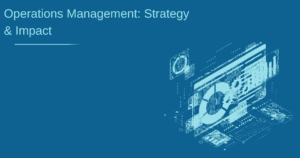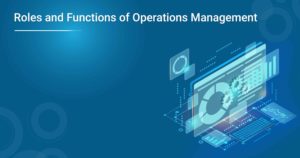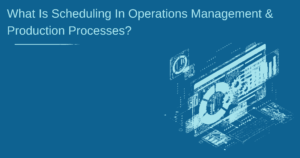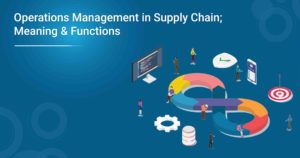Operations and supply chain management (OSCM) manages an organisation’s operations and supply chain. It includes planning, coordinating, and controlling all activities involved in producing and delivering a company’s products and services. OSCM also plays a crucial role in ensuring that the organisation’s operations are aligned with its strategic objectives. It overlooks both the manufacturing and service sectors.
Whether you are new to the concept of operations management and supply chain management or already well-acquainted with the topic, this guide will give you a comprehensive overview of what OSCM entails and how you can kickstart a successful career. We’ll cover the different aspects of OSCM, its importance in today’s business landscape, and the right skill set you need to thrive in this field.
Operations and Supply Chain Management: An Overview
Operations and supply chain management is a relatively new field that has emerged in response to the globalisation of business and the need for organisations to be able to operate across multiple geographical locations. OSCM encompasses various activities, including product design and development, production planning and control, inventory management, warehousing and distribution, and transportation.
The goal of OSCM is to help organisations improve their operational efficiency and effectiveness while reducing costs. In order to do this, OSCM practitioners need to have a strong understanding of both business and technical concepts. Effective communication with both business and technical staff becomes imperative.
The field of OSCM is constantly evolving as new technologies and methods are developed to improve business management. As such, OSCM practitioners must keep up with the latest trends and developments in the field.
If you have got an interest in kickstarting a career in operations and supply chain management, our Advanced Certificate in Ops, SCM, and PM is a one-stop destination to learn everything about OSCM and more.
What Is The Importance Of Operations And Supply Chain Management In Business?
Operations and supply chain management (OSCM) is critical to businesses because it encompasses the planning and execution of all the activities necessary to produce goods and services. It includes managing the flow of materials, information, and finances through the entire value chain, from suppliers to customers.
In today’s global marketplace, successful companies must manage their operations and supply chains effectively to be competitive. Many organisations are now turning to OSCM as a way to improve their performance and gain a competitive advantage. Many benefits can be realised by implementing an effective OSCM system.
Improved Efficiency
One of the essential benefits of OSCM is improved efficiency. By streamlining operations and supply chains, businesses can eliminate resource waste and reduce costs. Nothing can work better for a company than a well-oiled machine that can run smoothly and efficiently.
Increased Customer Satisfaction
Customer satisfaction is another potential benefit of optimum OSCM. When operations and supply chains are managed effectively, it leads to shorter lead times, higher quality products and services, and better overall service levels. All of these factors result in happier customers who are more likely to do business with the company again in the future.
Improved Collaboration
Effective OSCM also leads to improved collaboration between different departments and organisations within the supply chain. When all the team members are walking towards achieving common objectives, it results in a more streamlined and efficient operation.
Reduced Costs
Perhaps, the best benefit of adopting OSCM is reduced costs. With efficient utilisation of resources and harnessing the growth potential with operations and supply chain strategies, businesses can enjoy the perks of added revenue. This leads to lower production costs and, ultimately, higher profits.
Better Sourcing And Procuring
Another benefit of OSCM is better sourcing and procurement. When businesses have a better understanding of their supply chains, they are able to source materials and products more effectively. It paves the way for lower costs and improved quality.
Increased Cash Flow
Finally, effective OSCM leads to increased cash flow. When operations and supply chains are managed effectively, businesses experience shorter lead times and reduced inventory levels. This results in less money tied up in inventory and more cash available to reinvest into the business.
Overall, many benefits can be realised by implementing an effective operations and supply chain management system.
What Is The Role Of Technology In OSCM?
Technology plays a crucial role in operations and supply chain management. OSCM professionals use various types of software to help them manage operations and supply chains effectively. Some of the most popular software used in OSCM include supply chain management (SCM) systems, transportation management systems (TMS), and enterprise resource planning (ERP) systems.
Technology can help OSCM professionals in various ways. For instance, ERP systems can help organisations keep track of their inventory levels, orders, and production schedules. SCM systems can help organisations plan and execute their supply chain activities more efficiently. TMS systems can help organisations track and manage their transportation operations more effectively.
Artificial intelligence (AI) and machine learning (ML) are two emerging technologies starting to play a role in OSCM. AI and ML can help organisations automate various operations and supply chain activities. For instance, AI and ML can be used to automatically route shipments, track inventory levels, and predict demand.
Technology will always be omnipresent in operations and supply chain management and will make way for groundbreaking innovations in the future. OSCM professionals need to keep up with the latest technology trends to be able to manage operations and supply chains effectively.
Curious to learn more about operations and supply chain management and keep pace with the trending technologies? Check out our Advanced Certificate in Ops, SCM and PM today!
What Career Opportunities Await You in Operations And Supply Chain Management?
OSCM is a relatively new field that focuses on the management of both manufacturing and service operations and the supply chains that support them. OSCM professionals ensure that an organisation’s operations run smoothly and efficiently while meeting customer demands.
Many different career opportunities are available for those interested in pursuing a career in OSCM. Some of the most popular positions include operations, supply chain, and logistics managers.
Operations Managers – They oversee all aspects of an organisation’s operations, from production to customer service. They work closely with other members of management to ensure that all operation goals are met.
Supply Chain Managers – They manage the flow of goods and materials throughout an organisation’s supply chain. From sourcing raw materials to finished shipping products, it includes everything.
Logistics Managers – They are responsible for ensuring that an organisation’s operations run smoothly and efficiently by coordinating the movement of people, goods, and information. They work closely with other members of management to ensure that all operation goals are met.
If you’re interested in a career in OSCM, you can take several different paths. Different types of operations and supply chain management programs are available at colleges and universities across the country. Alternatively, you can get a degree in business with a focus on operations and supply chain management. Whatever path you choose, do your research and select a program that’s right for you.
Skills Required To Fulfill OSCM Function Appropriately
Skills are essential to excel in any field, and so is the case with OSCM. The skills required to perform the OSCM function appropriately can be classified into two broad categories: technical and behavioural skills.
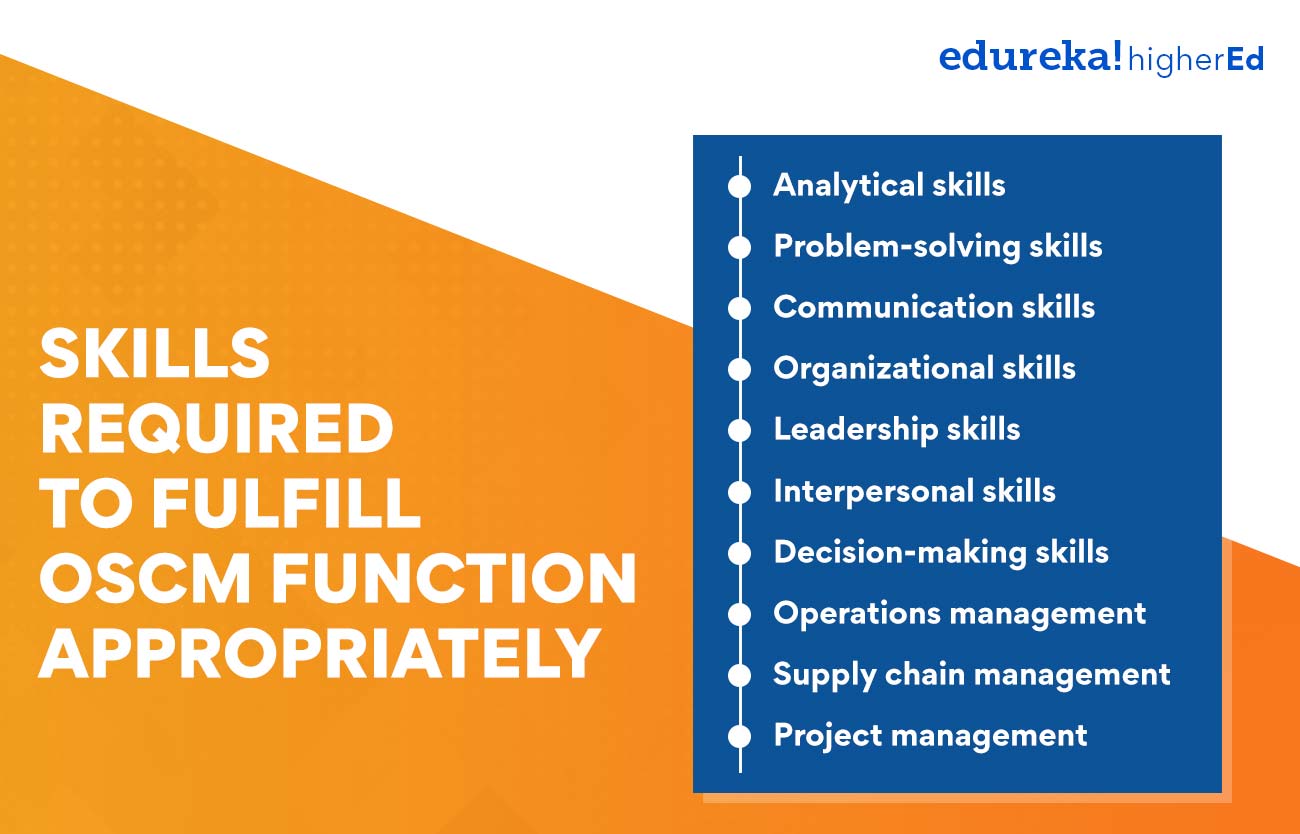
Technical skills are related to applying various tools, techniques, and concepts in operations and supply chain management. On the other hand, behavioural skills are more concerned with the ability to work effectively with people. Some of the specific skills required to perform the OSCM function include:
Analytical skills: Operations and supply chain managers must be able to analyse data and make decisions based on that data. They need to identify trends and understand how they will impact the supply chain. You must have a passion for data analysis to succeed in this field.
Problem-solving skills: Operations and supply chain managers are often tasked with solving complex problems. It is imperative to find out the root cause of a problem and then develop a plan to solve it. If you enjoy solving puzzles and getting deep into the solution, you will likely enjoy this aspect of the job.
Communication skills: Operations and supply chain managers must communicate effectively with people at all levels of the organisation. They need to explain complex concepts in a way that others can understand. From product development to supply, there will be instances where you need to communicate your ideas clearly.
Organisational skills: Operations and supply chain managers effectively manage their time and resources. They must be able to plan and execute projects within time and budget constraints. If you are naturally organised, then this aspect of the job will be a good fit for you.
Leadership skills: Operations and supply chain managers often find themselves in leadership positions. They are responsible for motivating and inspiring their team members to achieve common goals. If you love being around people and have a natural ability to lead, this job vertical may be for you.
Interpersonal skills: Operations and supply chain managers must have strong interpersonal skills. Effectively communicating and working with people at all levels of the organisation should be one of their many fortes.
Decision-making skills: Operations and supply chain managers must have strong decision-making skills. They should be able to analyse data and make sound decisions based on that data.
Operations management: Operations managers need to understand the various concepts and tools associated with operations management. All these concepts and tools must be applied to real-world situations in an appropriate manner.
Supply chain management: Supply chain managers should be well-versed in the intricate details of managing the supply chain. From the product packaging to delivery, there are lots of hats they must juggle to emerge victorious.
Project management: Project managers must have comprehensive knowledge regarding managing every project related to product development and supply. They play a crucial role in taking the product through every stage and finally making it our for grabs.
Operations and supply chain management is a complex field that requires specific skills to succeed. If you have the right skills, a career in OSCM may be the perfect fit.
Eligibility Criteria To Secure A Role in OCSM Field
There are many roles in the operations and supply chain management field, but not everyone is eligible for every position. To secure a role in OCSM, you must meet specific eligibility criteria.
The most crucial criterion is usually experience. Many employers demand that candidates should have at least a few years of experience in a related field before considering them for operations and supply chain management roles.
Education is also essential, although not always required. Many employers pick candidates who possess a bachelor’s degree or higher in business, engineering, or a related field. Candidates with certification from a professional organisation are also preferred.
Finally, most employers will require candidates to pass a background check and drug test. If you meet all of these criteria, you should be eligible for a role in OCSM.
OSCM As A Booming Career
Operations and supply chain management is the process of planning, coordinating, and controlling the operations of an organisation. It includes managing resources such as raw materials, inventory, staff, and equipment. OSCM also encompasses the movement of goods and services from supplier to customer.
To ensure that an organisation runs smoothly and efficiently, OSCM must be carefully planned and coordinated. In order to achieve this goal, OSCM must take into account all of the resources that an organisation has at its disposal. This includes both physical and human resources. By carefully managing these resources, OSCM can help an organisation to achieve its objectives.
Operations and Supply Chain Management is a career that is rapidly growing in popularity. This is due to the fact that OSCM provides individuals with the opportunity to prove their worth in a field that is challenging yet rewarding. Additionally, OSCM offers individuals the chance to work in various industries, which helps broaden their skill set.
If you also want to embrace the perks of a career in OSCM, we have got an insightful certification course that will provide you with a superior edge in the talent market. Check out our Advanced Certificate in Ops, SCM and PM, which many professionals have already benefited from.









